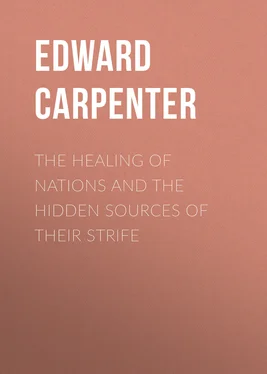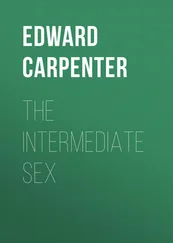Edward Carpenter - The Healing of Nations and the Hidden Sources of Their Strife
Здесь есть возможность читать онлайн «Edward Carpenter - The Healing of Nations and the Hidden Sources of Their Strife» — ознакомительный отрывок электронной книги совершенно бесплатно, а после прочтения отрывка купить полную версию. В некоторых случаях можно слушать аудио, скачать через торрент в формате fb2 и присутствует краткое содержание. Жанр: foreign_prose, История, foreign_edu, foreign_antique, на английском языке. Описание произведения, (предисловие) а так же отзывы посетителей доступны на портале библиотеки ЛибКат.
- Название:The Healing of Nations and the Hidden Sources of Their Strife
- Автор:
- Жанр:
- Год:неизвестен
- ISBN:нет данных
- Рейтинг книги:4 / 5. Голосов: 1
-
Избранное:Добавить в избранное
- Отзывы:
-
Ваша оценка:
- 80
- 1
- 2
- 3
- 4
- 5
The Healing of Nations and the Hidden Sources of Their Strife: краткое содержание, описание и аннотация
Предлагаем к чтению аннотацию, описание, краткое содержание или предисловие (зависит от того, что написал сам автор книги «The Healing of Nations and the Hidden Sources of Their Strife»). Если вы не нашли необходимую информацию о книге — напишите в комментариях, мы постараемся отыскать её.
The Healing of Nations and the Hidden Sources of Their Strife — читать онлайн ознакомительный отрывок
Ниже представлен текст книги, разбитый по страницам. Система сохранения места последней прочитанной страницы, позволяет с удобством читать онлайн бесплатно книгу «The Healing of Nations and the Hidden Sources of Their Strife», без необходимости каждый раз заново искать на чём Вы остановились. Поставьте закладку, и сможете в любой момент перейти на страницу, на которой закончили чтение.
Интервал:
Закладка:
From all this the danger of class-domination emerges more and more into relief. In Prussia the old Feudal caste remains—in a decadent state, certainly, but perhaps for that very reason more arrogant, more vulgar, and less conscious of any noblesse oblige than even before. By itself, however, and if unsupported by the commercial class, it would probably have done little harm. In Britain the Feudal caste has ceased to be exclusively military, and has become blended with the commercial class. The British aristocracy now consists largely or chiefly of retired grocers and brewers. Commercialism here has become more confessedly dominant than in Germany, and whereas there the commercial class may support the military in its ambitions, here the commercial class uses the military as a matter of course and for its own ends. We have become a Nation of Shopkeepers having our own revolvers and machine-guns behind the counter.
And yet not really a Nation of Shopkeepers, but rather a nation ruled by a shopkeeping class .
[This is the point in the text referred to by Footnote 25 below]
People sometimes talk as if commercial prosperity and the interests of the commercial folk represented the life of the whole nation. That is a way of speaking, and it illustrates certainly a common modern delusion. But it is far from the truth. The trading and capitalist folk are only a class, and they do not , properly speaking, represent the nation. They do not represent the landowning and the farming interests, both of which detest them; they do not represent the artisans and industrial workers, who have expressly formed themselves into unions in order to fight them, and who have only been able to maintain their rights by so doing; they do not represent the labourers and peasants, who are ground under their heel. It would take too long to go into the economics of this subject, interesting though they are. 10 10 See note infra on "Commercial Prosperity," p. 167. (Chapter XI below)
But a very brief survey of facts shows us that wherever the capitalist and trading classes have triumphed—as in England early last century, and until Socialistic legislation was called in to check them—the condition of the mass of the people has by no means improved, rather the contrary. Japan has developed a world trade, and is on the look out for more, yet never before has there been such distress among her mass-populations. Russia has been lately moving in the same direction; her commercial interests are rapidly progressing, but her peasantry is at a standstill, France and Italy have already grown a fat bourgeoisie , but their workers remain in a limbo of poverty and strikes. And in all these countries, including Germany, Socialism has arisen as a protest against the commercial order—which fact certainly does not look as if commercialism were a generally acknowledged benefit.
No, commercial prosperity means only the prosperity of a class. Yet such is the curious glamour that surrounds this, subject and makes a fetish of statistics about "imports and exports," that nothing is more common than for such prosperity to be taken to mean the prosperity of the nation as a whole. The commercial people, having command of the Press, and of the avenues and highways of public influence, do not find it at all difficult to persuade the nation that they are its representatives, and that their advantage is the advantage of all. This illusion is only a part, I suppose, of a historical necessity, which as the Feudal regime passes brings into prominence the Commercial regime; but do not let us be deluded by it, nor forget that in submitting to the latter we are being nose-led by a class just as much as the Germans have been in submitting to the Prussian Junkers. Do not let us, at the behest of either class, be so foolish as to set out in vain pursuit of world-empire; and, above all, do not let us, in freeing ourselves from military class-rule, fall under the domination of financiers and commercial diplomats. Let us remember that wars for world-markets are made for the benefit of the merchant class and not for the benefit of the mass-people, and that in this respect England has been as much to blame as Germany or any other nation—nay, pretty obviously more so.
What is clearly wanted—and indeed is the next stage of human evolution in England and in all Western lands—is that the people should emancipate themselves from class-domination, class-glamour, and learn to act freely from their own initiative. I know it is difficult. It means a spirit of independence, courage, willingness to make sacrifice. It means education, alertness to guard against the insidious schemes of wire-pullers and pressmen, as well as of militarists and commercials. It means the perception that only through eternal vigilance can freedom be maintained. Yet it is the only true Democracy; and the logic of its arrival is assured to us by the historical necessity that progress in all countries must pass through the preliminary stages of feudalism and commercialism on its way to realize the true life of the mass-peoples.
To-day the uprising of Socialist ideals, of the power of Trade Unions, and especially the formation of International Unions, show us that we are on the verge of this third stage. We are shaping our way towards the real Democracy, with the attainment of which wars—though they will not cease from the world—will certainly become much rarer. The international entente already establishing itself among the manual workers of all the European countries—and which has now become an accepted principle of the Labour movement—is a guarantee and a promise of a more peaceful era; and those who know the artisans and peasants of this and other countries know well how little enmity they harbour in their breasts against each other. Racial and religious wars will no doubt for long continue; but wars to satisfy the ambitions of a military clique or a personal ruler, or the ambitions of a commercial group, or the schemes of financiers, or the engineering of the Press—wars from these all too fruitful causes will, under a sensible Democracy, cease. If Britain, during the last twenty years, had really favoured the cause of the People and their international understanding, there would have been no war now, for her espousal of the mass-peoples' cause would have made her so strong that it would have been too risky for any Government to attack her. But of course that could not have happened, for the simple reason that Conservatism and Liberalism are not Democracy. Conservatism is Feudalism, Liberalism is Commercialism, and Socialism only is in its essence Democracy. It is no good scolding at Sir Edward Grey for making friends with the Russian Government; for his only alternative would have been to join the "International"—which he certainly could not do, being essentially a creature of the commercial regime. The "Balance of Power" and the ententes and alliances of Figure-head Governments had to go on, till the day—which we hope is at hand—when Figure-heads will be no more needed.
IV
THE CASE AGAINST GERMANY;
November , 1914.
With every wish to do justice to Germany, to whose literature I feel I owe such a debt, and among whose people I have so many personal friends; allowing also the utmost for the general causes in Europe which have been for years leading up towards war—and some of which I have indicated already in the pages above—I still feel it is impossible not to throw on her the immediate blame for the present catastrophe.
However we distribute the indictment and the charges among the various parties concerned, whether we accuse mainly the sway of Prussian Militarism or the rise of German Commercialism, or the long tradition and growth of a Welt-politik philosophy, or the general political ignorance which gave to these influences such rash and uncritical acceptance; or whether we accuse the somewhat difficult and variable personal equation of the Kaiser himself—the fact still remains that for years and years this war has been by the German Government most deliberately and systematically prepared for. The fact remains that Britain—though for a long period she had foreseen danger and had on the naval side slowly braced herself to meet it—was on the military side caught at the last moment unprepared; that France was so little intending war that a large portion of the nation was actually still protesting against an increase in the size of the standing army; and that Russia—whatever plans she may have had, or not had, in mind—was confessedly at the same period two years or so behind in the organization and completion of her military establishment.
Читать дальшеИнтервал:
Закладка:
Похожие книги на «The Healing of Nations and the Hidden Sources of Their Strife»
Представляем Вашему вниманию похожие книги на «The Healing of Nations and the Hidden Sources of Their Strife» списком для выбора. Мы отобрали схожую по названию и смыслу литературу в надежде предоставить читателям больше вариантов отыскать новые, интересные, ещё непрочитанные произведения.
Обсуждение, отзывы о книге «The Healing of Nations and the Hidden Sources of Their Strife» и просто собственные мнения читателей. Оставьте ваши комментарии, напишите, что Вы думаете о произведении, его смысле или главных героях. Укажите что конкретно понравилось, а что нет, и почему Вы так считаете.












